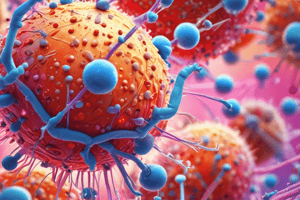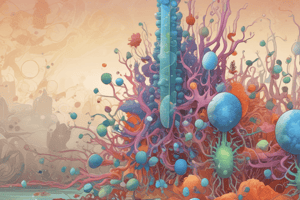Podcast
Questions and Answers
Name the Types of vaccines and an example of each ( tip 9)
Name the Types of vaccines and an example of each ( tip 9)
Live attenuated= Measles, Killes whole organism=whole cell pertussis, toxoid=tetanus, subunit recombinant protein = pertussis, Virus like particle= Human papillomavirus, OMV= Group B meningoccal, Protein-polysacharide conjugate= typhoid, Vrial vector= ebola, Nucleic acid= Covid
What is the difference between an antigen and an immunogen?
What is the difference between an antigen and an immunogen?
Antigen is a structure with 'in vitro' immunologic reactivity, while an immunogen is a structure that induces 'in vivo' immune response.
What is needed for a subsequent efficient induction of an innate and adaptive immune response?
What is needed for a subsequent efficient induction of an innate and adaptive immune response?
Antigen + 'defensive triggers'
What are the two types of pathogen-based antigens mentioned in the text?
What are the two types of pathogen-based antigens mentioned in the text?
What type of vaccines use inactivated toxins as antigens?
What type of vaccines use inactivated toxins as antigens?
What are the different types of pathogen subunit antigens mentioned in the text?
What are the different types of pathogen subunit antigens mentioned in the text?
What are the key advantages of the novel vaccine technologies such as viral vectors and mRNA?
What are the key advantages of the novel vaccine technologies such as viral vectors and mRNA?
What determines the final choice of antigen in vaccine development?
What determines the final choice of antigen in vaccine development?
Give an example of a live-attenuated vaccine.
Give an example of a live-attenuated vaccine.
What is the process involved in creating a live-attenuated vaccine?
What is the process involved in creating a live-attenuated vaccine?
What is the mechanism used to create reassortant live-attenuated vaccines?
What is the mechanism used to create reassortant live-attenuated vaccines?
How are killed/inactivated vaccines produced?
How are killed/inactivated vaccines produced?
What are the advantages of live-attenuated vaccines over killed/inactivated vaccines?
What are the advantages of live-attenuated vaccines over killed/inactivated vaccines?
What is the main disadvantage of live-attenuated vaccines?
What is the main disadvantage of live-attenuated vaccines?
What factor affects the stability of live-attenuated vaccines over time?
What factor affects the stability of live-attenuated vaccines over time?
What is a potential drawback of live-attenuated vaccines when administered with blood or blood-derived products or in presence of maternal antibodies in infants?
What is a potential drawback of live-attenuated vaccines when administered with blood or blood-derived products or in presence of maternal antibodies in infants?
Study Notes
Types of Vaccines
- There are several types of vaccines, including:
- Inactivated/killed vaccines
- Live-attenuated vaccines
- Subunit vaccines
- Conjugate vaccines
- Viral vector vaccines
- mRNA vaccines
Differences between Antigen and Immunogen
- An antigen is a substance that can trigger an immune response, but may not necessarily induce immunity
- An immunogen is a substance that can trigger an immune response and induce immunity
Requirements for Immune Response
- For a subsequent efficient induction of an innate and adaptive immune response, the presence of pattern recognition receptors, antigen presentation, and costimulation are needed
Pathogen-based Antigens
- Two types of pathogen-based antigens mentioned are:
- Inactivated toxins
- Pathogen subunit antigens
Subunit Antigens
- Pathogen subunit antigens can be further divided into:
- Protein-based antigens
- Polysaccharide-based antigens
- Conjugate antigens
Viral Vector and mRNA Vaccines
- The key advantages of viral vector and mRNA vaccines include:
- Rapid development and production
- Flexibility in design
- Ability to induce both innate and adaptive immune responses
Antigen Selection
- The final choice of antigen in vaccine development is determined by:
- The type of pathogen
- The immune response required
- The potential for immune evasion
Live-attenuated Vaccines
- Example of a live-attenuated vaccine: MMR vaccine
- To create a live-attenuated vaccine, the pathogen is weakened through serial passage, genetic modification, or chemical treatment
- The mechanism used to create reassortant live-attenuated vaccines is:
- Genetic reassortment of different viral strains
Killed/Inactivated Vaccines
- Killed/inactivated vaccines are produced by:
- Killing the pathogen through heat, chemicals, or radiation
- Inactivating the pathogen's ability to replicate
Advantages of Live-attenuated Vaccines
- Advantages of live-attenuated vaccines over killed/inactivated vaccines include:
- Induction of both innate and adaptive immune responses
- Longer-lasting immunity
- Mucosal immunity
Disadvantages of Live-attenuated Vaccines
- The main disadvantage of live-attenuated vaccines is:
- The risk of reversion to virulence
- The stability of live-attenuated vaccines over time can be affected by:
- Temperature fluctuations
- Storage conditions
- A potential drawback of live-attenuated vaccines is:
- Interference with the vaccine's ability to induce immunity when administered with blood or blood-derived products or in the presence of maternal antibodies in infants
Studying That Suits You
Use AI to generate personalized quizzes and flashcards to suit your learning preferences.
Related Documents
Description
Test your knowledge on vaccine antigens by understanding the definitions of antigens and immunogens, and their role in inducing immune responses. Explore the concepts of antigen-antibody interactions and their significance in vaccine development.




